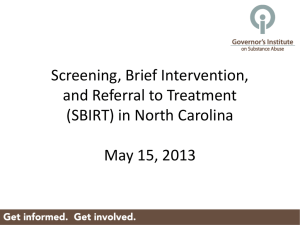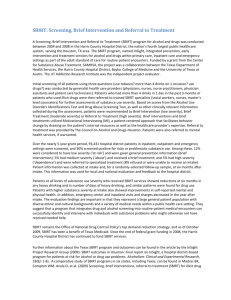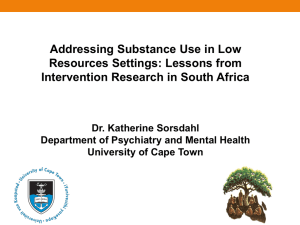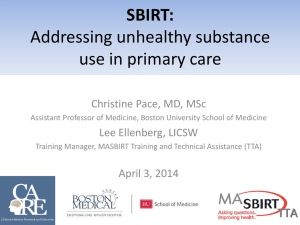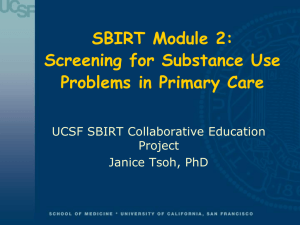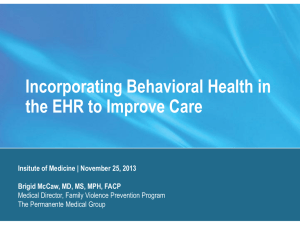Template for SBIRT Policy & Procedures for Healthcare Providers
advertisement
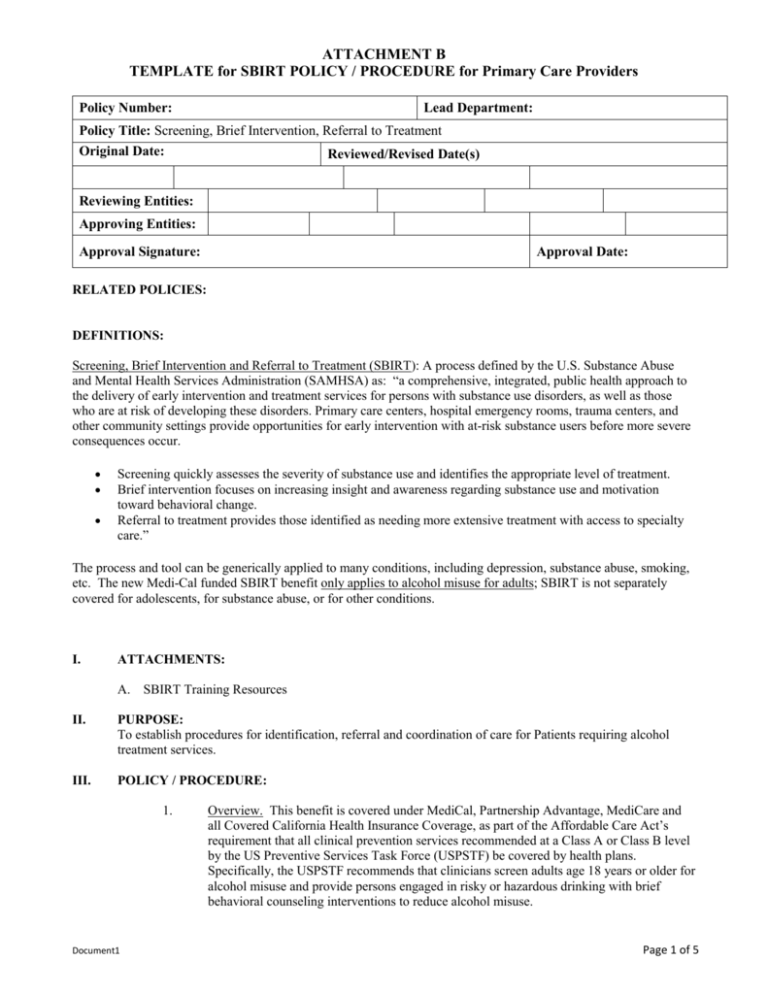
ATTACHMENT B TEMPLATE for SBIRT POLICY / PROCEDURE for Primary Care Providers Policy Number: Lead Department: Policy Title: Screening, Brief Intervention, Referral to Treatment Original Date: Reviewed/Revised Date(s) Reviewing Entities: Approving Entities: Approval Signature: Approval Date: RELATED POLICIES: DEFINITIONS: Screening, Brief Intervention and Referral to Treatment (SBIRT): A process defined by the U.S. Substance Abuse and Mental Health Services Administration (SAMHSA) as: “a comprehensive, integrated, public health approach to the delivery of early intervention and treatment services for persons with substance use disorders, as well as those who are at risk of developing these disorders. Primary care centers, hospital emergency rooms, trauma centers, and other community settings provide opportunities for early intervention with at-risk substance users before more severe consequences occur. Screening quickly assesses the severity of substance use and identifies the appropriate level of treatment. Brief intervention focuses on increasing insight and awareness regarding substance use and motivation toward behavioral change. Referral to treatment provides those identified as needing more extensive treatment with access to specialty care.” The process and tool can be generically applied to many conditions, including depression, substance abuse, smoking, etc. The new Medi-Cal funded SBIRT benefit only applies to alcohol misuse for adults; SBIRT is not separately covered for adolescents, for substance abuse, or for other conditions. I. ATTACHMENTS: A. SBIRT Training Resources II. PURPOSE: To establish procedures for identification, referral and coordination of care for Patients requiring alcohol treatment services. III. POLICY / PROCEDURE: 1. Document1 Overview. This benefit is covered under MediCal, Partnership Advantage, MediCare and all Covered California Health Insurance Coverage, as part of the Affordable Care Act’s requirement that all clinical prevention services recommended at a Class A or Class B level by the US Preventive Services Task Force (USPSTF) be covered by health plans. Specifically, the USPSTF recommends that clinicians screen adults age 18 years or older for alcohol misuse and provide persons engaged in risky or hazardous drinking with brief behavioral counseling interventions to reduce alcohol misuse. Page 1 of 5 Policy Number: Lead Department: Policy Title: SBIRT Policy Original Date: Reviewed/Revised Date(s) Counseling interventions in the primary care setting can positively affect unhealthy drinking behaviors in adults engaging in risky or hazardous drinking. Positive outcomes include reducing weekly alcohol consumption and long-term adherence to recommended drinking limits. Because brief behavioral counseling interventions can decrease the proportion of persons who engage in episodes of heavy drinking (which results in high blood alcohol concentration), indirect evidence supports the effect of screening and brief behavioral counseling interventions on important health and social welfare outcomes, such as the probability of traumatic injury or death especially that related to motor vehicles. a. Pre-screen or brief screen is considered part of routine primary care and is not separately reimbursed. The following short pre-screening questions have been integrated into the DHCS-approved Staying Healthy Assessment 1) Adults: i. Men under age 65: In the past year, have you had 5 or more drinks in one day? ii. Women under age 65: In the past year, have you had 4 or more drinks in one day? 2) b. 2. If the AUDIT or AUDIT-C (see below) is used as an alternative pre-screening tool, it may be billed as an SBIRT screening if the result is positive. Pre-screening a. The following short pre-screening questions have been integrated into the DHCSapproved Staying Healthy Assessment, which is integrated in the Electronic Health Record 1) Adults: i. Men under age 65: How many times in the past year have you had 5 or more drinks in a day? ii. Women under age 65: How many times in the past year have you had 4 or more drinks in a day? 2) 3. Seniors: In the past year, have you had 4 or more alcohol drinks in one day. Seniors: In the past year, have you had 4 or more alcohol drinks in one day. Screening Patients answering yes to the pre-screening question will have and Expanded screening done Alcohol Use Disorder Identification Test—Consumption (AUDIT-C). If the screen is positive (>3 for women or >4 for men), the patient is at risk for alcohol misuse or abuse, and will be referred for brief intervention. Screening test results, interpretation and any resulting patient-specific recommendations are documented in the medical record. Sample SBIRT screening Page 2 of 5 Policy Number: Lead Department: Policy Title: SBIRT Policy Original Date: 4. Reviewed/Revised Date(s) Brief Intervention Brief interventions include motivational interviewing and cognitive behavioral techniques tailored to the member’s stage of readiness to make a change. Elements of brief interventions may include personalized feedback, education and resources, negotiated action plans, drinking use diaries, and stress management. The brief intervention(s) can be provided by the PCP or a supervised or other health care team member as described below. The brief intervention includes one to three sessions, 15 minutes in duration per session, offered in-person or via telemedicine. SBIRT brief intervention services must be documented in the medical record. This should include the specific intervention employed with the patient and the time spent with the patient, if greater than 15 minutes of brief intervention is to be claimed at one visit. 5. Referral to Treatment a. Patients who are found, upon screening and further evaluation, to meet criteria for alcohol use disorder as defined by the DSM, or those whose diagnosis are uncertain, will be referred for further evaluation and treatment. b. Patients will be referred to their County Alcohol and Drug Program for provision of treatment, as medically necessary. County contacts for local substance use disorder treatment information and referrals can be found on the PHC website: http://www.partnershiphp.org/Members/MC_MbrEN.htm#mental toward the bottom of the page under the heading “HELP FOR SUBSTANCE ABUSE” c. Referrals to treatment must be documented in the medical record. 6. Training and Proficiency Screening and Brief Intervention services are provided by a licensed health care provider or staff working under the supervision of a licensed health care provider. The following licensed health care providers are eligible to provide services or supervise staff that are providing services. a. Licensed Physician b. Physician Assistant c. Nurse Practitioner d. Psychologist e. Licensed Clinical Social Worker The following licensed and registered providers also may perform Screening and/or Brief Intervention in the primary care setting, under the direction of one of the 4 provider types above. a. Licensed Marriage and Family Therapist b. Registered Nurse c. Certified Nurse Midwife d. Licensed Professional Clinical Counselor All health care providers listed above must be trained in order to provide or supervise individuals providing SBIRT services. They should be trained and proficient in screening to provide screening services, and also trained and proficient in brief intervention if they will provide brief intervention services. a. Sample SBIRT screening Other members of the health care team (such as medical assistants, health educators or substance abuse counselors) may also conduct SBIRT if: Page 3 of 5 Policy Number: Lead Department: Policy Title: SBIRT Policy Original Date: Reviewed/Revised Date(s) 1) 2) 3) 4) 7. They have at least 100 hours of clinical experience in their current role. They are trained to provide the services they are providing The supervising Medical Director or physician is responsible for evaluating the capacity of the staff they are supervising, and assuring the quality of screening and brief intervention provided by their non-licensed provider staff. The PCP site will maintain a list of licensed and registered professionals and non-licensed members of the health care team who have completed training in screening and/or brief intervention and are proficient in its administration and are thus approved to provide screening and/or brief intervention services at the PCP site. This list is signed by the Medical Director or supervising physician. A quality assurance process for SBIRT services a. Yearly Chart Review of randomly selected charts to ensure documentation appropriate to coding. b. Yearly report to compare rates of use of codes for screening and brief intervention between different PCPs to identify providers not performing expanded screening or referring for brief intervention. IV. REFERENCES: For clinician support: NIAAA’s Clinician Guide “Helping Patients Who Drink Too Much” provides two methods for screening: a “single question” to use during a clinical interview and a written self-report instrument (AUDIT). http://www.niaaa.nih.gov/guide The AUDIT and AUDIT-C screening instruments for alcohol misuse are available from the Substance Abuse and Mental Health Services Administration-Health Resources and Services Administration Center for Integrated Health Solutions www.integration.samhsa.gov/clinical-practice/screening-tools Note: Although instruments are available for download, it does not include instructions/training for their implementation. A complete guide to clinical implementation of the AUDIT screening instrument is available by the World Health Organization http://whqlibdoc.who.int/hq/2001/who_msd_msb_01.6a.pdf Information on the MediCare SBIRT benefit and requirements: http://www.cms.gov/Outreach-andEducation/Medicare-Learning-Network-MLN/MLNProducts/downloads/sbirt_factsheet_icn904084.pdf V. DISTRIBUTION: Sample SBIRT screening Page 4 of 5 Policy Number: Policy Title: SBIRT Policy Original Date: Lead Department: Reviewed/Revised Date(s) Attachment A SBIRT Training Resources A list of trainings and resources is included below. Additional resources will be available on the DHCS web site. SAMHSA funded – Addiction Technology Transfer Center Network: “Foundations of SBIRT” 1.5 hour course Introduction of terms, topics and resources Free CA CE Certificate Available $7.50 to receive 1.5 contact hour units from NAADAC, NBCC, and/or NASW http://www.attcelearn.org/ NIAAA Clinician’s Guide Online Training “Video Cases: Helping Patients Who Drink Too Much” Four interactive, 10-minute video cases Implementing Single Question and AUDIT Screening Tools Evidence-based clinical strategies Patients with different levels of severity and readiness to change Free CME/CE credits for physicians and nurses through Medscape® http://www.niaaa.nih.gov/publications/clinical-guides-and-manuals/niaaa-clinicians-guide-online-training SBIRT Core Training Program: Screening, Brief Interventions, and Referral to Treatment Four hour training: $50 per individual; group rates are available CEUs available http://www.sbirttraining.com/sbirtcore SAMHSA-HRSA Center for Integrated Health Solutions: Motivational Interviewing 3-Part Pre-Recorded Webinar Series Includes recording, presentation, and transcript Additional resources No certificate available Free http://www.integration.samhsa.gov/clinical-practice/motivational-interviewing Substance Use in Older Adults: Screening and Treatment Intervention Strategies 3 hour training Free CA CE Certificate $15.00 to take the course and earn 3.00 NAADAC Continuing Education Units (CEUs) and 8.00 NBCC clock hours Sample SBIRT screening Page 5 of 5
